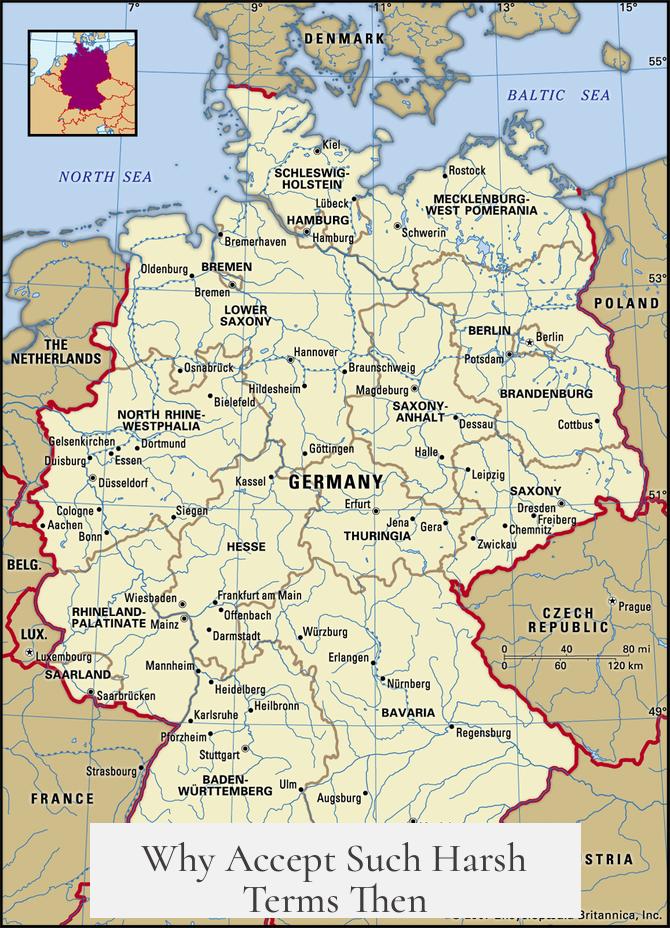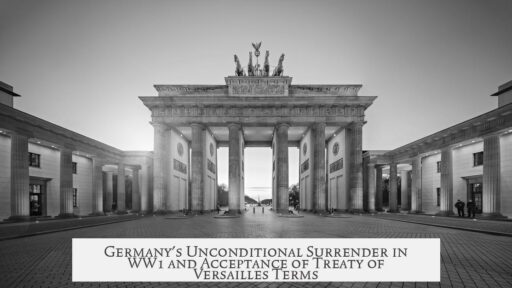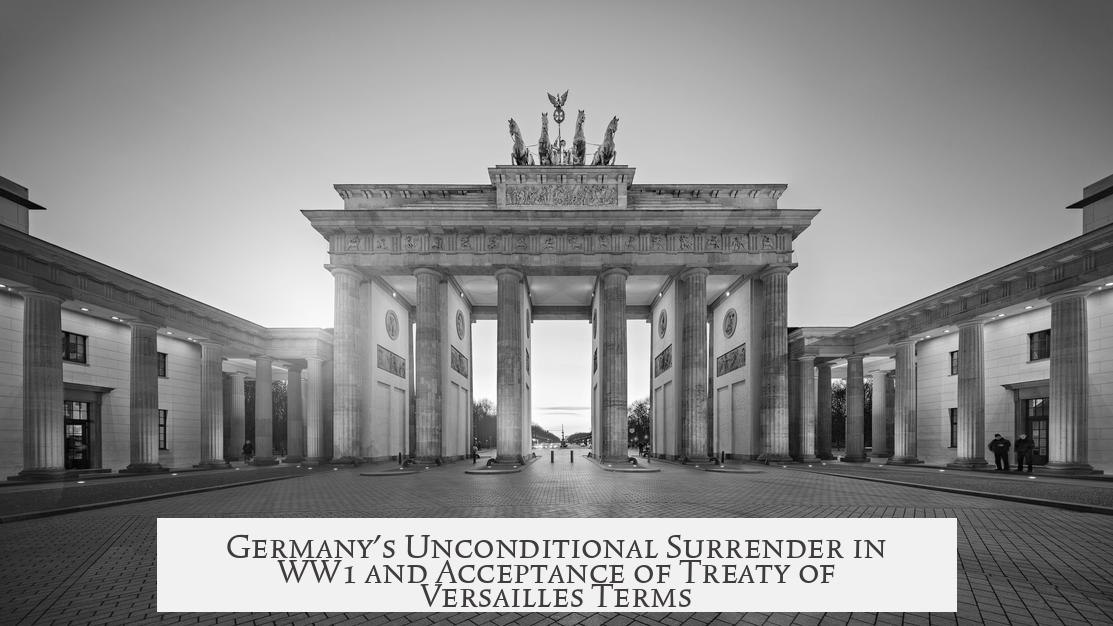Germany unconditionally surrendered in World War I and accepted the harsh terms of the Treaty of Versailles mainly because it faced comprehensive military defeat, severe logistical breakdowns, depletion of resources, and political collapse. The German army was decisively outmatched on the battlefield by the Western Allies’ Hundred Days Offensive beginning in August 1918. This series of offensives pushed Germany into continuous retreats and defensive battles, significantly weakening its military capacity.
One critical factor was the loss of Germany’s main railway supply line during the Hundred Days Offensive. This line was vital for transporting bulk supplies to German forces on the Western Front. Its capture by the Allies meant that while the German army had not entirely disintegrated, its situation became unsalvageable. Supplies for troops dwindled rapidly, severely impairing combat effectiveness.
Germany also struggled to sustain its war effort due to industrial and manpower exhaustion. The country’s industrial base could no longer meet the massive demands of prolonged warfare. Simultaneously, German forces faced grave manpower shortages, leading to a critical depletion of soldiers available for front-line service.
Compounding military troubles was the collapse of Germany’s allies. Austria-Hungary, Bulgaria, and the Ottoman Empire were either severely defeated or seeking peace. Internally, Germany’s political situation deteriorated sharply. The Imperial government collapsed, Kaiser Wilhelm II abdicated, and revolutionary unrest spread, including mutinies in the Imperial German Navy. These domestic upheavals raised fears of a broader revolution akin to Russia’s.
Recognizing the untenable military and political situation, key German leaders acknowledged the need to end the war. Field Marshal Hindenburg and General Ludendorff, pivotal in wartime strategy, called for an immediate armistice in September 1918. Ludendorff resigned, replaced by Wilhelm Groener, who confirmed that seeking peace was the only viable option. Germany deliberately approached the Americans for an armistice in hopes of receiving more lenient terms.
Contrary to later myths propagated in Germany, the surrender was not the result of a “stab-in-the-back” betrayal but a factual military collapse. This myth, notably exploited by Adolf Hitler, obscured the reality that the German army and its allies were in full collapse by November 1918.
Delaying the peace negotiations worsened Germany’s position. Allied commanders later remarked that, had they known the true state of German collapse, the terms imposed might have been even harsher. Nevertheless, the Treaty of Versailles imposed severe conditions that reflected Germany’s comprehensive military and political defeat.
- Germany’s unconditional surrender followed overwhelming Allied military victories and loss of vital supply routes.
- Industrial failure and manpower exhaustion crippled Germany’s war effort.
- The collapse of allies and internal political unrest undermined Germany’s capacity to continue fighting.
- Military leadership acknowledged defeat and sought armistice, particularly appealing to the U.S. for leniency.
- The “stab-in-the-back” legend was a false narrative contradicting the factual military collapse.
- Delays in seeking peace worsened Germany’s negotiating stance but ultimately led to acceptance of harsh treaty terms.
Germany’s surrender and acceptance of the Treaty of Versailles resulted from overwhelming battlefield defeat, systemic logistical and resource collapse, allied implosion, and political disintegration, leaving the nation with no viable alternative but to yield to the demands of the victors.
Why Did Germany Unconditionally Surrender in WW1 and Accept Such Harsh Terms as the Ones in the Treaty of Versailles?

Germany unconditionally surrendered in WW1 and accepted harsh Treaty of Versailles terms because it faced crushing military defeat, loss of vital supply lines, depleted resources, collapsing allies, and a collapsing home front. Their leaders saw no realistic choice but to quit.
Let’s unpack this dramatic moment in history with clarity and a dash of insight into why Germany’s surrender made such a splash, and why the Treaty of Versailles ended up so severe. No cloak-and-dagger here, just facts and a slice of human judgment under extreme pressure.
From Battlefields to Broken Rails: The Military Collapse
By the summer of 1918, Germany faced relentless pressure. The Western Allies launched the Hundred Days Offensive in August, a sweeping general attack that steadily forced German troops into retreat. Imagine being outnumbered, out-produced, and out-fought—everywhere you look, your forces are pushed back.
This was not a rusty old army faltering; it was a modern force fighting desperately but losing ground every day. They weren’t merely losing battles; they were hemorrhaging overall control. German soldiers found themselves trapped in holding actions just to slow the Allied tide. The writing was on the wall.
But wait, the military disaster went beyond the front lines. The Allies didn’t just advance; they smashed Germany’s main railway supply line—crucial arteries that moved everything from food to ammunition.
The loss of the railway meant a drastic cut in supplies reaching the troops. Despite some units holding their lines, the army couldn’t sustain itself. The logistical backbone broke, and so did hopes of turning the tide.
Depleted Strength: Manpower and Industry Worn to a Thread
War isn’t won on courage alone. It demands steady resources, fresh troops, and factories humming day and night.
Germany’s factories couldn’t churn out weapons fast enough, and soldiers were simply running out. Frontline shortages became common: food, ammunition, even basic supplies grew scarce.
With an industrial base strained and a manpower pool thinning, Germany was losing this war of attrition. They faced a grim two-front squeeze with no relief in sight.
Allies Down, Empire Crumbling

What happens when your friends bail? Germany found out the hard way.
- Austria-Hungary was on its last legs.
- Bulgaria and the Ottoman Empire sought peace deals to save what remained.
- The German government itself was fraying. The Kaiser abdicated in late 1918, stripping Germany of its imperial leadership.
- To add fuel to the fire, the Imperial Navy mutinied, sparking fears of revolution akin to Russia’s upheaval just a year prior.
Politically and militarily, Germany was hip-deep in trouble. The state and its allies were collapsing from within and without.
The Last Call for Peace: Leadership Realizes the End is Near
By late September 1918, the grim truth couldn’t be ignored. Germany’s top generals, Hindenburg and Ludendorff, pushed for surrender to avoid total annihilation. Ludendorff resigned shortly after, replaced by Wilhelm Groener.
Groener shared the stark view: the war was lost. An armistice was the only option.
But Germany did what any savvy, cornered nation does—they sought negotiations with the Americans, banking on the idea that the U.S. might offer more lenient terms than the French or British.
Unfortunately for Germany, this hope was more wish than reality.
Myth vs Reality: No ‘Stab-in-the-Back’ Here
After surrender, a powerful myth took hold in Germany—the “stab-in-the-back” legend. It claimed Germany wasn’t defeated militarily but betrayed by civilians and socialists at home.
This tale, deliberately false, was later exploited by Hitler to fuel nationalist anger. The truth was harsh:
The German army and its allies were collapsing comprehensively by November 1918. There was no external villain sabotaging victory; the defeat was clear on the battlefield and in the halls of power.
Why Accept Such Harsh Terms Then?

You might wonder, why swallow the bitter pill of the Treaty of Versailles when defeat had already been shown?
Here’s the catch—the longer Germany delayed surrender, the weaker their negotiating position. Allied commanders knew Germany’s true state only later in the conflict.
Marshal Foch reportedly said if the Allies had known how broken Germany truly was, they might have demanded even harsher terms.
In short, Germany’s delay lost it leverage. The heavy demands on reparations, territorial losses, military restrictions—all were consequences of a lost war and a weakened position at the peace table.
Lessons and Reflections
Germany’s unconditional surrender and acceptance of harsh peace terms illustrate the brutal reality of war: defeat wounds deeply and often leaves no room for negotiation. When military, political, and economic foundations crumble, options dry up fast.
For students of history, this period offers a clear-eyed lesson: one must recognize defeat honestly and promptly. Delayed acceptance of reality often makes consequences worse.
Also, myths around military defeat can distort national narrative dangerously, as the “stab-in-the-back” legend tragically proved.
Summary Table: Why Germany Surrendered and Accepted Versailles Terms
| Factors | Details |
|---|---|
| Military Defeat | Comprehensive defeat in the field; outnumbered and outproduced by Allies during the Hundred Days Offensive. |
| Logistical Collapse | Loss of key railway supply lines critical for troop and resource movement. |
| Resource Depletion | Industrial capacity strained; manpower running out; shortages at the front. |
| Allied Collapse | Collapse/defeat of Austria-Hungary, Bulgaria, Ottoman Empire; German government collapse; mutiny and revolution fears. |
| Leadership Recognition | Realization by military leadership that the war was lost; calls for armistice. |
| Delay Costs | Later surrender worsened Germany’s position; harsher terms imposed. |
| Political Myths | “Stab-in-the-back” myth obscured reality but held no truth militarily. |
So, when you sum it all up, Germany’s unconditional surrender is less a story of defeat by betrayal and more a lesson in strategic reality, the limits of war endurance, and the harsh handshake peace sometimes demands.
What else do you think shaped this monumental turn? History is never just black and white.
Why did Germany surrender despite still having an army in the field?
Germany was outnumbered and out-produced on the battlefield. The army held on but lost its main railway supply line, making continued fighting impossible. Eventually, military leaders saw no realistic chance to win.
How did the collapse of Germany’s allies affect its decision?
Allies like Austria-Hungary and the Ottoman Empire were defeated or seeking peace. This left Germany isolated and forced it to face defeat alone, weakening both military and political positions.
What role did internal political changes play in Germany’s surrender?
The German government fell, the Kaiser abdicated, and the navy mutinied. These events caused fear of revolution and made continuing war impossible without risking further chaos.
Why did German leaders seek an armistice from the Americans?
Germany hoped the Americans would offer more lenient peace terms. Seeking an armistice was a way to avoid total collapse and negotiate rather than face unconditional defeat on the battlefield.
Was Germany really undefeated militarily at the time of surrender?
No. Contrary to the ‘stab-in-the-back’ myth, the German army and its allies were collapsing fully by November 1918. The surrender followed clear military defeat, not internal betrayal.
Did delaying peace talks worsen Germany’s situation?
Yes. The longer Germany waited, the weaker its negotiating position became. Allied commanders believed harsher terms could have been imposed if they understood Germany’s dire condition sooner.




